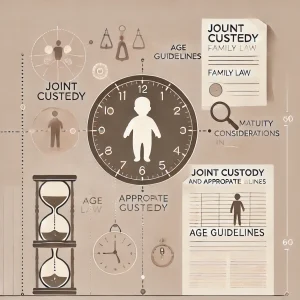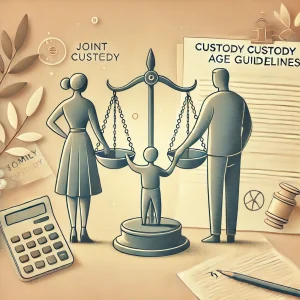Joint Custody of What Age | Joint custody is custody in which the child’s time spent with his parents is usually half – half. Everyone knows that a child needs both parents to be present in his life
Joint custody is custody in which the child’s time spent with his parents is usually half – half. It is well known that the child needs both parents to be present in his life, especially when both parents were present in his life until the day of the divorce, in some cases child support will not be paid.
As for the question of at what age will joint custody be determined and whether there is a minimum age below which the father will not receive joint custody of his child, the answer is that the father is the natural guardian of his child, and the fact that he is a parent does not change the day after divorce. Therefore, there is no specific age from which onwards it is possible to obtain joint custody of the child, so that at any age the court can rule on the child’s joint custody, despite the presumption of early childhood. 
Many fathers do not know whether they are entitled to custody or joint custody in early childhood, and from what age will custody include accommodation with the father? Even in this case, there is no minimum age from which the court will rule on accommodation with the father.
It is true to say that the younger the baby is and under certain circumstances (e.g., a breastfeeding mother), the court will tend to rule on longer stays with the mother, but the father will certainly be able to receive joint custody that includes accommodation, with good and proper guidance for the specific case.
Today, there is some progress in the law regarding equality between the father and the mother in the field of alimony. Unlike in the past, when alimony was then almost automatically set for the father, today there is a lot of consideration for the income of both parties. Also, even if exclusive custody of the mother has been determined, an application can be made to the court to transfer custody from the mother to the father, in which case it is customary to reduce a certain amount of child support, since increasing the child’s stay with the father means increasing the father’s expenses.
Joint custody from what age also refers to joint custody without alimony and can exist if both spouses bear the burden of raising the children equally and the mother’s salary is equal to and even exceeds that of the father. Since joint custody exists at any age, with proper counseling with a divorce lawyer it is possible that no alimony for the father will be terminated at all.
The divorce process is complex, painful and can lead to arguments and quarrels. Usually children are involved in the process and then the situation is even more difficult. In order for the divorce to be carried out quickly, efficiently and without problems it is mandatory to hire the services of a divorce lawyer who specializes in the field of family law. One of the major issues to be decided in a divorce is child custody.
Parents are legally guardians of their children up to the age of 18 and in the event of a divorce it must be decided with which parent they will stay. In most cases, child custody in a divorce will be in the custody of the mother automatically, especially if the child has not turned six yet. When there are disputes over who will be the custodian, the couple can separately file a child custody divorce claim in family court or rabbinical court.
Determination of child custody in a divorce is made on the basis of the best interests of the child. The desire is to leave the child with the most appropriate parent according to indicators such as the degree of strength of the relationship between the parent and the child, the parent’s availability, the degree of closeness and attentiveness of the parent to the child, etc. The court decision also includes the will of the child if he is over the age of ten. Before this age the assumption is that the child is not yet able to form a firm position. In addition, the court ensures that the child is not manipulated by one of the parents. Many times the court appoints a social worker who will provide him with an opinion on the child or the judge will meet with him alone. There is a difference between the will of the child and the principle of the best interests of the child which is his mental and physical health, the important figures in the child’s life, the age and developmental needs of the child and more. The court thoroughly examines the best interests of the child at a given time and thereafter.
If the court fails to rule on child custody in a divorce it can decide based on a parental capacity test. The parents and children undergo tests and diagnosis by professionals such as a social worker to test the interaction between the parent and the children. Once the professionals submit their report to the court, the experts can be questioned in court and a decision will be made regarding the child’s custody.

The determination regarding joint custody from what age can be changed later, mainly due to changes in the circumstances or the will of the child. The court ensures that there is also contact with the non-custodial parent so that there is no incitement against him on the part of the custodial parent. The court considers the need of the noncustodial parent to be close to their children and involved in their lives. The court determines the times when stay arrangements will take place and the spouse will visit his children. The frequency of the visits depends on the age of the child. Most stay arrangements include twice-weekly meetings at regular hours and every other weekend. The holidays are divided alternately and during the holidays the meetings are more frequent.
If one of the parents applies to the court for a change of stay arrangements, he must provide the proof and details. Change of custody occurs due to relocation, transfer of the parent abroad, violence of the parent towards the child, violation of residency arrangements. When the reference is backed by evidence there is an opening for a change of the judgment on the issue of custody.
“The importance of the child’s relationship with both parents is increasing, especially when it comes to a young child. Young children lose feelings towards people whom they do not see often and frequently and develop a sense of alienation towards them.
This is due to the complexity in time perception of the child. He does not understand the significance of the duration of the second parent’s absence. At an early age, it is very important to maintain a close relationship with both mother and father. ”
In principle, each case will be examined according to its circumstances and if the best interests of the child will also allow for joint custody of a young child, then the court will grant this request. In cases where there is violence on the part of the mother towards the children or in cases where the mother has no parental capacity then custody will be transferred to the father exclusively.